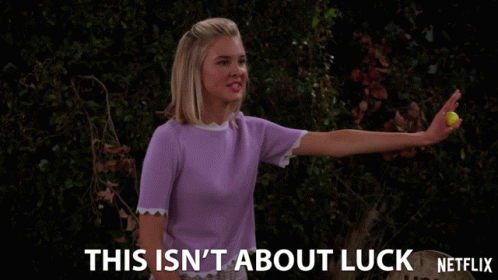Why You Haven't Achieved Your Goals Yet (Hint: It's Not Just Bad Luck)
In a recent conversation with a potential client, I was initially surprised by their reluctance to invest in executive coaching. The client told me that they believed in the power of coaching but also believed that most successful people were not necessarily smarter or more talented than themselves, but just luckier. They said that knowing the right people and having the right support was ultimately the determining factor in success, and no amount of self-improvement could change that. As a result, this client had given up on their aspirations for a promotion and greater visibility in their field, believing that they didn't have the necessary connections or support to succeed.
This conversation left a lasting impression on me because the client's mindset was limiting and their belief in luck was doing more harm than good. By adopting this attitude, the client was holding themselves back from taking the necessary actions to achieve their goals and succumbing to a victim mentality. While luck can play a role in creating opportunities, success is the result of a combination of factors, including hard work, perseverance, talent, opportunity, technology, innovation, networking, and building relationships. Believing that luck is the primary factor can be detrimental to one's perception of themselves and prevent them from reaching their full potential.
How big we think determines the size of our accomplishments.
In this case, my potential client, who did ultimately decide to work with me, was thinking small - about himself.
When it comes to success, people are not measured by their degrees, background, or network, but by the size of their thinking. How big we think determines the size of our accomplishments.
In this case, my potential client’s small thinking was rooted in the limiting belief that their greatest weakness was not knowing the right people and having access to the "right" opportunities, but in reality, their greatest weakness was self-deprecation. They were selling themselves short.
Even in the face of challenging or seemingly unfair circumstances, your thinking must remain true to size and in alignment with your value.
To help keep your thinking in alignment with your real value when challenged, try the quick two-step exercise below from Dr. David J. Schwartz, author of "The Magic of Thinking Big.”
#1 Determine your 5 chief assets. Invite some objective friend to help, - possibly your partner, your superior, a professor-some intelligent person who will give you an honest opinion. (Examples of assets include education, experience, technical skills, appearance, well adjusted home life, attitudes, personality, initiative.)
#2 Determine the value of those assets. Under each asset, write the names of 3 persons you know who have achieved large success but who do not have this asset to as great a degree as you?
When you’ve completed this exercise, you will find you outsize many successful people on at least one asset.
Who’s lucky now?
The reality is you’re always more (insert a good quality) than you think you are. So fit your thinking to your true size. Think as big as you really are and never sell yourself short.
By focusing on your strengths, building your skills, speaking positively about yourself and taking action towards your goals, you will create your own luck and achieve the success you desire.
That’s what my client did … and they received that promotion.
Where else in your life can you stand to increase the size of your thinking? Let me know in the comments below!


